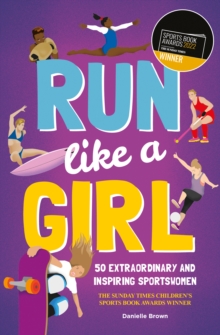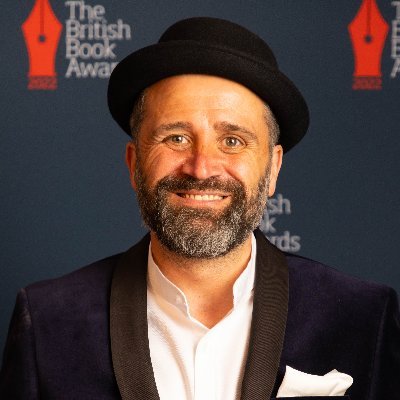The Power of Reading Aloud
22nd May 2023
"One of the greatest privileges of being a Paralympian is getting to put something back. I love visiting schools to share my story of what it takes to become the best in the world. One question I get asked a lot is: “who was your sporting role model when you were our age?”
"The problem was that I didn’t have one."
"Female athletes didn’t get much coverage at the time, and honestly, I couldn’t name a single one. I didn’t get to watch them on TV, read about them in books, or talk about them in the playground."
"And this was a big problem. Because I didn’t see female athletes winning – or failing, for that matter – it a huge impact on what I thought I could or couldn’t be. I didn’t even consider sport when I was thinking about what I wanted from my future. It wasn’t because I didn’t like sport (I really did!) – I just didn’t know it was an actual career choice. It wasn’t until I was much older that I realised this lack of role models shaped the decisions I made, the beliefs I held, and the future I was creating for myself."
"The cherry on the top was the monumentally destructive phrase “you run like a girl!”. I heard this far too frequently to sum up bad performances in boys. This reaffirmed everything I thought I knew: sport was a good way to keep fit and healthy but girls didn’t really belong there doing the serious stuff."
"I was lucky. This thinking got overturned in my teens, with the help of my parents and my club coaches. When I started archery at the age fifteen, my coaches saw something in me and they were full of encouragement. “You have potential,” they told me. As I searched for my arrows with help from the club’s trusty metal detector I’m not entirely sure what they saw, but they believed in my abilities and I went along with it. I wanted to be the person they saw so I worked hard, pouring my energy and enthusiasm into it. Every personal best reaffirmed this – I had potential and one day I was going to reach it."
"Three years later I burst onto the international scene, jumping straight in as World Number 1 and hanging onto that position for the rest of my career. I travelled the world, winning five World Championship titles and two Paralympic gold medals, the first in Beijing 2008 and retaining my title on home soil, in London 2012. I also became the first disabled person to represent England as an able-bodied athlete, winning a gold medal at the Commonwealth Games in the team event."
"Role models are important. Representation matters. We need a space where we can see women succeeding, thriving, failing, bouncing back, and testing the limits of human endurance. This is powerful stuff: it changes perceptions and rewrites some of those harmful stereotypes that sadly still exist today. To run like a girl, throw like a girl, and play sport like a girl is something that we should – and can – be very proud of."
"We are heading in the right direction. With more and more success stories making their way to the limelight, like the Lionesses iconic win last summer, these amazing role models are beginning to get the attention they deserve. And it is making an impact. At schools, I hear from more and more girls who want to go to the Olympics, do an ironman, or become an international cricketer."
"But, we still have a long way to go to level the playing field. The gender divide in sport is enormous, from pay to media exposure, and this message trickles all the way down to grassroots, influencing beliefs and behaviours along the way."
"I wrote Run Like A Girl because I wanted to do something about it. I wanted to highlight some of the amazing female athletes out there and the incredible things they are doing. The book is packed with 50 stories of inspiring female athletes from all over the world, from adventurers to Olympians, and showcases the resilience, determination and confidence they used to achieve success. It shows that athletes come from many different backgrounds and find their way into sport in completely different ways: some overcame unimaginably tough barriers to achieve their sporting dreams, some led teams, and others are using sport as a vehicle to make the world a better place."
"We are all capable of achieving great things, and we all need a bit of encouragement along the way. Visibility matters. It’s not just about losing yourself in a story, but finding yourself in one and relatable role models – for both girls and boys – can change the way they see themselves and impact their ambitions for the future. Seeing how others fought through setbacks and dug in to keep their dream alive shows children that there is no limit to their potential or barrier impossible to break – regardless of where they come from, what sport they like, or what gender they are."
- Danielle Brown

Run Like A Girl
Brown, Danielle
Paperback / softback
All over the world, female athletes are breaking barriers, pushing limits and achieving amazing things, but where did their journeys begin? And what challenges did they have to overcome to get where they are today?
Run Like a Girl is a collection of fascinating biographical stories told of 50 highly successful sportswomen, from boxing superstar Nicola Adams to record-breaking yachtswoman Ellen MacArthur and fearless mountain biker Rachel Atherton. As well as giving an insight into their influences, motivations and achievements, each story reminds us that failing can teach us just as much as winning; success isn't limited to the sports field; and 'running like a girl' can lead you all the way to the top.
More DetailsAbout the Author

Phil Earle
Born and raised in the north of England, Phil is the author of over twenty acclaimed, award-winning books for children and teenagers. He has worked as a carer, a dramatherapist, a bookseller and a publisher, and loves talking at schools and festivals around the world. He now divides his time between writing and his role as Sales and Marketing Director at David Fickling Books. Phil has been Writer in Residence for Booktrust, and has won multiple awards – The Books are my Bag Readers Award, The British Book Award for Children’s Fiction, The Times Children’s Book of the Year to name but a few. He lives on the side of a very steep hill with his partner, their five children and two dogs.
